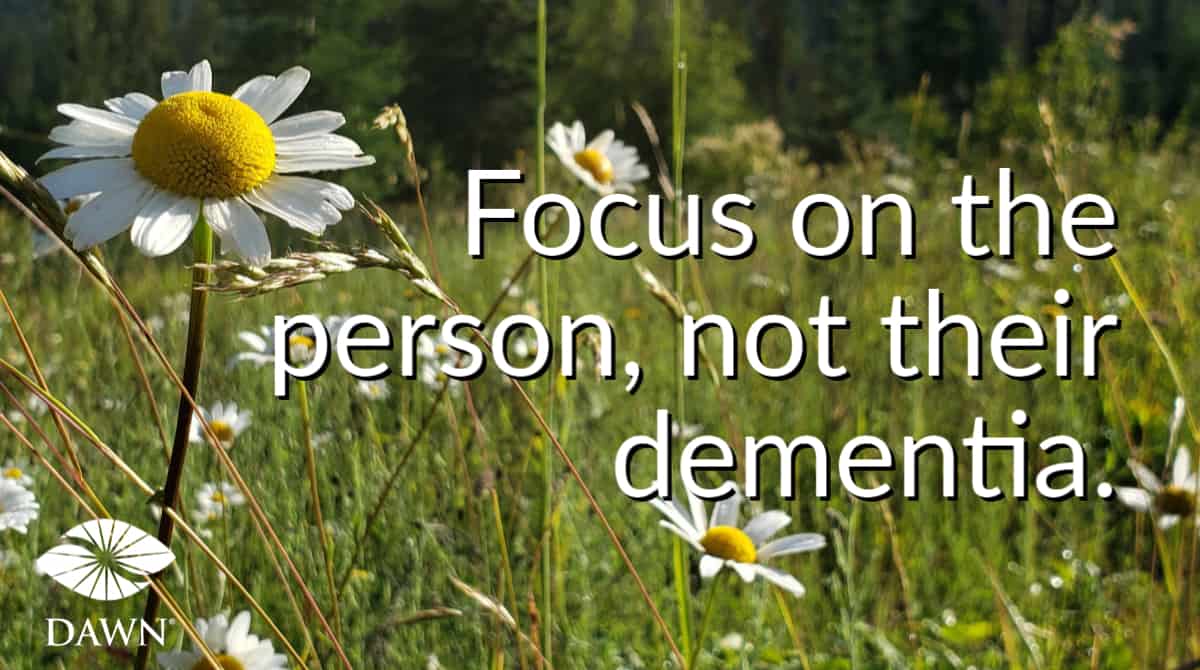The Dementia Handbook:
How to Provide Dementia Care at Home
The Dementia Handbook is the dementia caregiver book that introduces the DAWN Method—the kind, person-centered, strength-based approach to dementia care (available in paperback, Kindle, and Audible versions – search for it on iTunes/iBooks).
Purchase at Amazon
Customer Reviews
4.6 out of 5 (800+ ratings at Amazon)
“If you read only one book about Dementia this is the one to read! My wife has Dementia and Judy Cornish has faithfully, compassionately and effectively guided us both through the last two years. Judy has both the knowledge and experience needed to be of great and immediate help to those seeking clear and concise answers to the daily problems of Dementia. This book is a must read for those traveling the difficult and profound Dementia Journey!”
~ David & Kim (Review on Amazon)
“This is an extremely important and informative book, which provides a revolutionary and compassionate new approach to a widespread problem that’s a mystery to most, especially to patients and their families. Judy Cornish explains a complex topic in clear, commonsense language, and provides simple, easy-to-apply methods for dealing with it. This book will be a comfort and a guide to many. Highest possible recommendation.”
~ Tom Mueller (Review on Amazon)
“I cannot stop buying this book! My personal copy has been given away four times and I bought copies for my independent 95 year old mother’s home health nurse, her neighbor, her housekeeper and three potential future care givers! All joyful feedback! The ease of Judy’s process is so accessible that you start integrating it before you can get to Chapter Two.”
~ Louise C. (Review on Amazon)
“I found this book very useful. I have a parent who is starting to show signs of dementia. I especially liked the real world examples that helped me to see how I could use these tools in my own situation.”
~ alrizon (Review on Amazon)
“Incredibly helpful for anyone who has a parent or spouse suffering from dementia or other related malady. This is a great guide and helps get one through all the incredibly difficult times.”
~ Cindy (Review on Amazon)
NOTE: Judy’s longer book, Dementia with Dignity: Living Well with Alzheimer’s and Dementia Using the DAWN Method, is also available at Amazon.com. The Dementia Handbook is shorter (108 pages) and covers the philosophy of the DAWN Method while Dementia With Dignity is longer (271 pages) and contains more “how-tos” and real-life examples.

Author, Judy Cornish
“Even though when we’re experiencing dementia, we become unable to recall or recount what is happening to us, we fully experience the present. The psychological present lasts about three seconds. Our moods and reactions are expressions of our experiences in the present.”
TEDx Talk
Listen to Judy’s TEDx Talk entitled, “The Dawn of Dementia Care”
From The Dementia Handbook
Table of Contents:
- Chapter 1: Bad, but Not All Bad
- Chapter 2: Not All Is Lost
- Chapter 3: Designing Person-Directed Care
- Chapter 4: Person-Directed Care in Action
- Chapter 5: Why Should We?
Intuitive Thought / Rational Thought
Although we lose rational thinking skills to dementia, we retain the more important ones: intuitive thought. It’s intuitive thought that lets us enjoy creativity, beauty and feelings. When our companions understand this, they can fill our lives with positive moods and beauty.
Experiential Self / Remembering Self
People who are experiencing dementia lose memory skills, but they don’t lose the ability to experience the present because they continue to receive information through their senses. This means we can fill the present with beauty and creativity and enjoy it with them.
Mindlessness / Mindfulness
When we lose the ability to focus and direct our attention, we lose the ability to be mindful. But we keep two very important tools: muscle memory and automatic thinking scripts. When we design care to extend our loved ones’ ability to use these tools, we enhance their dignity and autonomy.
When dementia caregivers recognize these three pairs of skills, living and working with people who have dementia becomes much easier. Caregivers experience less stress and their loved ones experience a greater sense of security and wellbeing.
Book Excerpt:
“When people begin to experience dementia—as memory falters and fails, and rational thought processes become intermittent and then elusive—their sense of security evaporates. There is nothing scarier than realizing that you can no longer trust your brain to correctly interpret the world around you or supply you with accurate information. Even when people are unaware of how impaired they are, they seem to know their futures are at risk. Living with worsening forgetfulness and confusion and knowing that you will become completely unable to care for yourself is rightfully terrifying.
“People experiencing dementia need help in recovering a sense of security before they can recapture any lasting sense of well-being. Unless their caregivers and loved ones show them that they can still be safe despite dementia, that ever-so-necessary sense of comfort in the day-to-day routines of life will be fleeting.
“[At DAWN,] we help our clients begin to feel secure even though they are confused, because we use our own rational thought skills when analysis is necessary, and we use our own memories to supply the gaps in theirs. When they ask questions, we remind ourselves that although they have lost the ability to retain information, they still need to know what’s going on as much as we do. We never jog their memories, knowing that testing memory only serves to prove and prove again that they’ve lost the ability to remember, not just the memories themselves.
“We also help them find what they’ve misplaced or complete a task without ever saying, “I’ve already told you” or “I can’t believe you don’t remember that.” When we offer help as an equal and teammate, rather than a superior or instructor, our clients’ dignity and sense of autonomy remain intact. There is no loss of control or hurt feelings. With our own rational thought skills, we foresee the next step in a task and work with them rather than direct them.
“Further, as their sense of reality becomes increasingly divergent from ours, we accept it as the inevitable result of progressive cognitive impairment and accommodate it, rather than demand that they use skills that no longer exist. While we are doing this, our clients begin to relax and feel secure in the knowledge (through experiential learning while with us) that we will take care of them despite their growing needs and escalating confusion.”
Judy Cornish
Someone is diagnosed with dementia every 66 seconds; By 2030, the rate will be someone every 33 seconds.
Paying for home care is expensive, but the cost of institutional care is astronomical—averaging over $93,000/year in 2021. We need to learn how to provide effective dementia care at home. This book equips families to do so.
Book Details:
Author: Judy Cornish
Publish Date: March 13, 2017
Book Formats: Paperback, Kindle, Audiobook
Paperback Price: $9.00 USD
Kindle Price: $4.49 USD ($0.00 on Kindle Unlimited)
Audiobook Price: $4.87 USD or one credit
Pages: 108
Available at: Amazon.com
Publisher: CreateSpace Independent Publishing Platform
Genre: Health, Alzheimer’s Disease, Dementia
Language: English
ISBN-10: 1541326555
ISBN-13: 978-1541326552

From the book:
“As caregivers, we err if we assume that the loss of the remembering self means the loss of the experiential self. Dementia takes away the ability to remember, but it does not take away the ability to experience. [this is SO important]”
About the author, Judy Cornish
Judy Cornish is a geriatric care manager and retired elder law attorney who began working with families and people experiencing dementia on the Palouse over a decade ago. Prior to her work in dementia care, she practiced law, worked in vocational rehabilitation with traumatic brain injury, and spent a year as a psychosocial skills trainer in an enhanced care unit for the mentally ill.
With her varied background—and education in literature, languages, fine arts and the law—she brings a diverse set of skills and a unique approach to dementia care. Her DAWN Method® enables families to keep their loved ones home longer, with less stress and more comfort. Judy previously founded and managed Palouse Dementia Care, providing case management and care services in Moscow, Idaho. She now runs the Dementia & Alzheimer’s Wellbeing Network (DAWN), offering training and consulting in the DAWN Method.
Judy Cornish in front of forest and mountains
